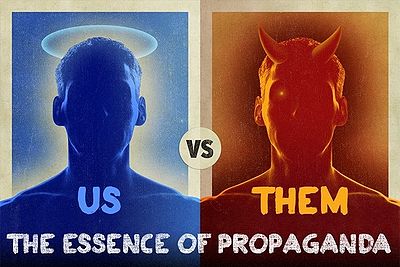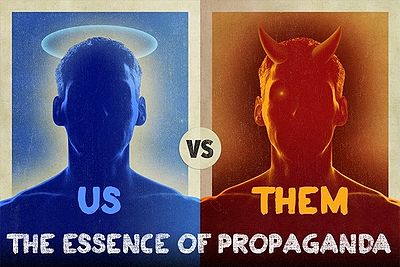America is exceptional alright. It is the most frightened nation on Earth, subjected to hysterical propaganda over decades warning about foreign enemies and ideologies. No wonder its supposed democratic freedom is in so appallingly bad shape, when the preponderant population is imprisoned by their rulers in a virtual cage of fear.
Paradoxically, though, the dissonance of supposed freedom could not be more abysmal. At a press conference at the Cannes film festival last week American screen actor George Clooney digressed from his latest movie to talk about Republican presidential contender Donald Trump. Clooney, who is well known for his liberal brand of US politics and a big supporter of Democrat candidate Hillary Clinton, predicted that rightwing business tycoon Trump would not win the forthcoming November presidential contest.
Clooney dismissed Trump as a demagogue sowing fear and divisive tensions along racial and xenophobic lines. Which is fair enough. Of interest here is not so much the actor’s views on Trump’s chances of political success. Rather, it is Clooney’s premise that Americans would not succumb to reactionary fear peddling.
Seated at the press conference alongside his American co-star Julia Roberts and film director Jody Foster, Clooney told his Cannes audience: ”Fear is not going to drive our country… we’re not afraid of anything.”
Well, sorry George, but you are dead wrong on that score. Fear is the paramount emotional driver in American politics since at least the Second World War, and probably decades before that too.
Contrary to Clooney’s bravado, Americans are very, very afraid.
The biggest bogeyman for the US public was the Soviet Union, whose specter dominated American politics for nearly 50 years. This specter has been conjured up again through casting Russia and its President Vladimir Putin as intent on “resurrecting the Soviet Union.”
It was Hillary Clinton – Clooney’s political champion – who made the ridiculous and historically illiterate charge that Putin is the “new Hitler.” Many other senior US political figures and Western news media have since stampeded like a herd in likewise demonizing the Russian leader.
The unquestioned consensus in Washington, from President Barack Obama to his foreign secretary John Kerry, and from senior Congressional figures to the Pentagon chiefs, is that Russia is an existential threat to global security.
America’s new NATO military chief General Curtis Scaparrotti has warned that the US-led alliance must be prepared to go to war against Russia at any moment due to alleged Russian aggression towards Eastern Europe and the Baltic states.
The Cold War has thus been rehabilitated a quarter of a century since the Soviet Union dissolved. As in former times, fear is once again fueling American politics. Consistently, there is negligible objective basis for this mass phenomenon. Russia today is not a threat to the US or its NATO allies, just as the Soviet Union was not a threat.
Bombastic claims about Russian “annexation” and “invasion” of Ukraine are factually tenuous, spurious or devoid. The claims don’t stand up to scrutiny. But that’s hardly the point. The point is that the false narrative – propaganda – of alleged Russian malevolence is amplified and repeated over and over again in Western “independent” media, not unlike the Big Lie technique of Nazi spinmeister Josef Goebbels.
US and Western allies, with the help of pliable news media, in effect are able to construct their own false “reality.” It is not objective reality. It is a subjective, delusional “reality” one in which Western nations are portrayed to be under threat from a stalking, salivating enemy in the form of Russia.
Fear is a powerful lever for control over populations, as English author George Orwell keenly perceived. Get the public to fear for their lives from an external enemy, and they will be easily manipulated into accepting authority, no matter how draconian and illegitimate that authority is. Fear is the key to surrendering democratic rights and submitting to a cage.
From the end of the Second World War in 1945, the West immediately needed the Cold War with the Soviet Union as a bulwark against more progressive, democratic development within their own countries. American writer David Talbot in his book, The Devil’s Chessboard, clearly depicts how Wall Street, the Pentagon and ideologically inclined politicians were able to construct the monstrous military-industrial complex and its gargantuan consumption of economic resources for the enrichment of an elite ruling class – based on Cold War angst and trepidation about the “evil Soviet Union.”
When a minority of skeptical, more independently intelligent politicians, authors or artists questioned the Cold War assertions they were peremptorily ostracized as “Reds,” “traitors” or indeed assassinated by the military-industrial complex, as David Talbot convincingly argues in the case of President John F Kennedy.
This perverse distortion and waste of US economic resources – a $600 billion military budget year after year overshadowing all other social needs – is engineered precisely through fear. American military might must be supreme and sacrosanct in order to “defend” or “protect” US vital interests and those of its allies from “existential threats.” Russia, and to a lesser extent China, continues to be designated in the role of global threat.
To this end, Americans have been subjected to a relentless psychological program – euphemistically referred to as “news” – for the past seven decades. Europeans too. Perhaps in the whole of Europe the British media is the most toxic and reactionary when it comes to demonizing Russia.
The manipulation of the Western public mind is flagrant. The claims against Russia are preposterous, but astoundingly the manipulation, to a degree, succeeds.
However, the domination through fear is not as omnipotent as it once was. During the former Cold War, the Western public were far more susceptible to the depiction of “evil” Soviet menace.
This is no longer the case. Western media have long been discredited over fabricating lies, such as the pretext for the Bush-Blair war on Iraq and other criminal US-led regime-change operations, including Libya, Syria and Ukraine. Today, Western citizens have more access to alternative information sources, including Russian mass media and critical Internet news outlets within their own countries. The Big Lie technique, while still potent, is not quite as effective as it was in former times.
This new historical development in public awareness is reflected in the growing, popular discontent across Europe towards governments that are seen to be slavishly toeing Washington’s policy of aggression against Russia. Citizens are angrily questioning why they are made to accept economic austerity while US-led sanctions against Russia are hitting their jobs, businesses, and export revenues. Citizens are rightly furious that they are told there are no financial resources for public services and infrastructure, while billions of dollars are pumped into NATO forces to recklessly provoke tensions with Russia.
Of course, the anomalies in Western government priorities with regard to meeting public needs are ludicrous, unjustifiable, and unsustainable. And the only way that Western rulers can get away with such absurd denial of democratic realities is to play the fear factor. Nowhere has the fear factor been played more than in the US – ironically, the nation which proclaims from the rooftops to be exceptional, free, and democratic.
George Clooney would do better to stick to the silver screen where his heroics and valor shine larger than life – in fiction. ”The American people are not afraid of anything,” he claimed in real life. George, with respect, your people are the most scared on the planet; and the brainwashing system is so good, that you and they don’t even know that. Indeed, haven’t even an inkling of the gross manipulation.
Reprinted with permission from the Strategic Culture Foundation.


